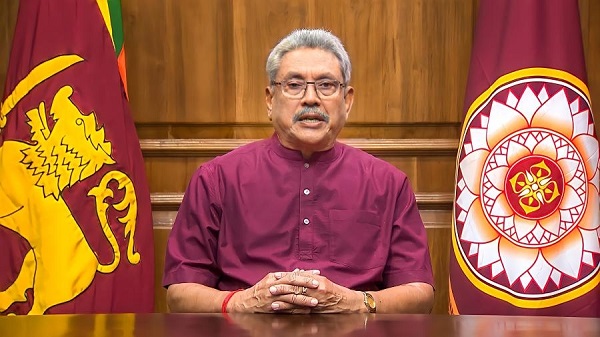Colombo, (Asian independent) Beleaguered Sri Lankan President Gotabaya Rajapaksa on Monday admitted several mistakes that he made and apologised to the people who are suffering due to the ongoing economic crisis faced by the island nation.
Addressing the newly-appointed 17 Cabinet ministers and 21 state ministers, Rajapaksa said, “People are under immense pressure due to this economic crisis. I deeply regret this situation.”
He also admitted the delay to seek the support of the International Monetary Fund (IMF) amid the severe financial crisis, and said “the decision not to provide chemical fertilisers to farmers was an error”.
During his two-and-a-half-year tenure, there were challenges, including the Covid-19 pandemic, the debt burden, and “some mistakes on our part”, Rajapaksa confessed.
“They need to be rectified. We have to correct them and move forward. We need to regain the trust of the people,” he told the newly-appointed ministers.
Rajapaksa also justified the public anger over the unbearable cost of living, but refused to give up his post despite mounting public pressure around the country with massive protests demanding him to step down.
“The pain, discomfort and anger displayed by the people for having to spend time in queues to get essential items at a high price that cannot be afforded due to rising cost of living is justified. Whatever the shortcomings were in the past, it is my responsibility as the people elected me as the President to manage the present challenges and difficulties,” he said, adding: “I promise to the people who have elected me that I will not abdicate that responsibility in the midst of any difficulty or challenge.”
Referring to India’s financial assistance of nearly $2.5 billion received since January “for the import of fuel, medicines and other essential commodities, Rajapaksa said that Sri Lanka needs the support of the friendly countries and the international organisations.
“We need the support of the international organisations such as the International Monetary Fund as well as friendly countries to overcome the serious challenge that we are facing today,” he said.
While warning the new ministers of the severe foreign exchange deficit and the debt crisis faced by the country, Rajapaksa said that a debt restructuring programme has commenced while the creditors have already informed “of the difficulty in repaying short-term foreign loans”.
However, the President, who stressed that international support could be obtained only if “there is political stability”, urged the opposition parties which had earlier refused to join hands to form an all-party interim government to rejoin him.
“They still have the opportunity to accept my invitation and work with us,” he said.
With constitutional changes, Rajapaksa, who regained sweeping executive powers, which were abolished by his predecessor Maithripala Sirisena, expressed his willingness to make way for constitutional changes forwarded by various political parties, including to reduce the powers of the President.
The main opposition had said that it is willing to talk about an interim government if the President is ready to shed his super powers and restore parliamentary powers.
Denying one of the popular slogans raised by the protesters that Rajapaksas have looted the country, the President said, “I have never stolen the funds of the people of this country. My hands are always clean; then and today.”
Facing severe hardships with no fuel, electricity, cooking gas, food and medicine amid skyrocketing inflation and dollar crunch, Sri Lankan people took to the streets on March 31, blocking the way to Rajapaksa’s house in Colombo suburbs.
Reacting to the development, the police dispersed the crowd but a fresh protest started on April 2 defying the emergency law and curfew imposed by Rajapaksa. The protests have continued demanding all in the Rajapaksa government to step down.








